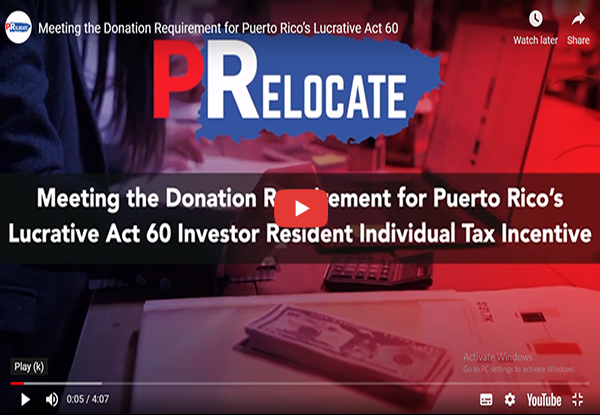How to Think About Transfer Pricing for International Businesses
- Posted: May 15, 2018
- Posted by: Travis Lynk
- Last Reviewed: June 6, 2024

How to Think About Transfer Pricing for International Businesses
Individuals with shared ownership in more than one business in different tax jurisdictions must consider transfer pricing, the study of how these businesses transact with each other. While the business owner desires to realize income and profits in the lowest tax jurisdiction, the opposing tax jurisdiction desires the opposite. Due to this possible conflict of interest the IRS has robust rules and methodologies in place to ensure that an appropriate transfer price, or allocation of value, has been established. The question any business needs to ask is, “if these two entities were not related, would the price being charged be reasonable and fair?”. Transfer pricing is relevant for Act 60 companies that create value in both Puerto Rico and the United States.
“Globalization and the rapid growth of international trade has made inter-company pricing an everyday necessity for the vast majority of businesses. However, the growth of national treasury deficits and the frequent use of the phrase ‘transfer pricing’ in the same sentence as ‘tax shelters’ and ‘tax evasion’ on the business pages of newspapers around the world have left multinational enterprises at the center of a storm of controversy.”
-PWC Transfer Pricing Report 2016
How does Transfer Pricing Work?
The purpose of transfer pricing is to establish “arm’s length” interactions, which requires prices charged between related parties be equivalent to those that would have been charged between independent parties in the same circumstances. Let’s look at two simple examples:
Example 1: Tangible property (goods)
- PenCo US manufactures a pen in the US for $0.10.
- PenCo PR sells the pen for $1.00 in Puerto Rico, and spends $0.10 on marketing.
- PenCo US now has $0.80 of profits ($1.00 – $0.10 – $0.10).
- The transfer pricing question: where does PenCo US realize these profits, and in what amount? A number of variables will be taken into consideration to determine what percentage of the $0.80 gets assigned to Puerto Rico versus the US. This in turn determines the tax obligation.
Example 2: Intangible property (services)
- BloodCo US owns blood centers in Florida where they take blood from customers and earn $100.
- BloodCo PR is based in Puerto Rico and manages the operations of BloodCo US.
- BloodCo PR handles all executive leadership, strategy, expansion, and marketing from Puerto Rico.
- BloodCo PR charges BloodCo US a 75% “management fee” on all profits.
- The transfer price question: what percent of value is actually being created by BloodCo PR? Is this 75% reasonable? This allocation will determine the tax obligation.
What is a Transfer Pricing Study?
A company completes a transfer pricing study to provide the economic analysis necessary to support its transfer pricing decisions in case it is challenged by the IRS or tax authorities in another jurisdiction.
Transfer pricing is closely monitored within a company’s financial reporting and can become even more important when requested by regulators or auditors. If inappropriately documented, a business can incur material taxes, fees, or penalties. While companies like Apple grab the headlines for their various shell companies around the world, all businesses should be on the offensive to ensure compliance.
Considerations for a transfer pricing study:
- Analysis of value creation
- Economic circumstances
- Market analysis to establish a non-related entity basis
- Inter-company agreements for each transaction or transfer
- Annual reviews
- Audit readiness
- Compliance with IRS Section 482
Outputs of a transfer pricing study:
- A transfer pricing policy
- Documentation of company structure and transactions
- Decision rationale
- Conclusions that establish said transfer prices are reasonable
Transfer Pricing Considerations as They Relate to Puerto Rico
There is no absolute rule for determining a transfer price, which leaves companies exposed to tax authorities and operating with a degree of uncertainty. At a minimum, a company will want to have documentation and evidence that describes an approach before doing business so that you can produce it quickly in the event of an audit. Case law is rife with examples of businesses that failed to consider transfer pricing – the penalties and costs can be severe.
The Puerto Rico Treasury Department has historically avoided the implementation of a specific policy; however, it seems they will soon adopt the globally recognized OECD Transfer Pricing Guidelines.
Contact us for more information.
Disclaimer: Neither PRelocate, LLC, nor any of its affiliates (together “PRelocate”) are law firms, and this is not legal advice. You should use common sense and rely on your own legal counsel for a formal legal opinion on Puerto Rico’s tax incentives, maintaining bona fide residence in Puerto Rico, and any other issues related to taxes or residency in Puerto Rico. PRelocate does not assume any responsibility for the contents of, or the consequences of using, any version of any real estate or other document templates or any spreadsheets found on our website (together, the “Materials”). Before using any Materials, you should consult with legal counsel licensed to practice in the relevant jurisdiction.





